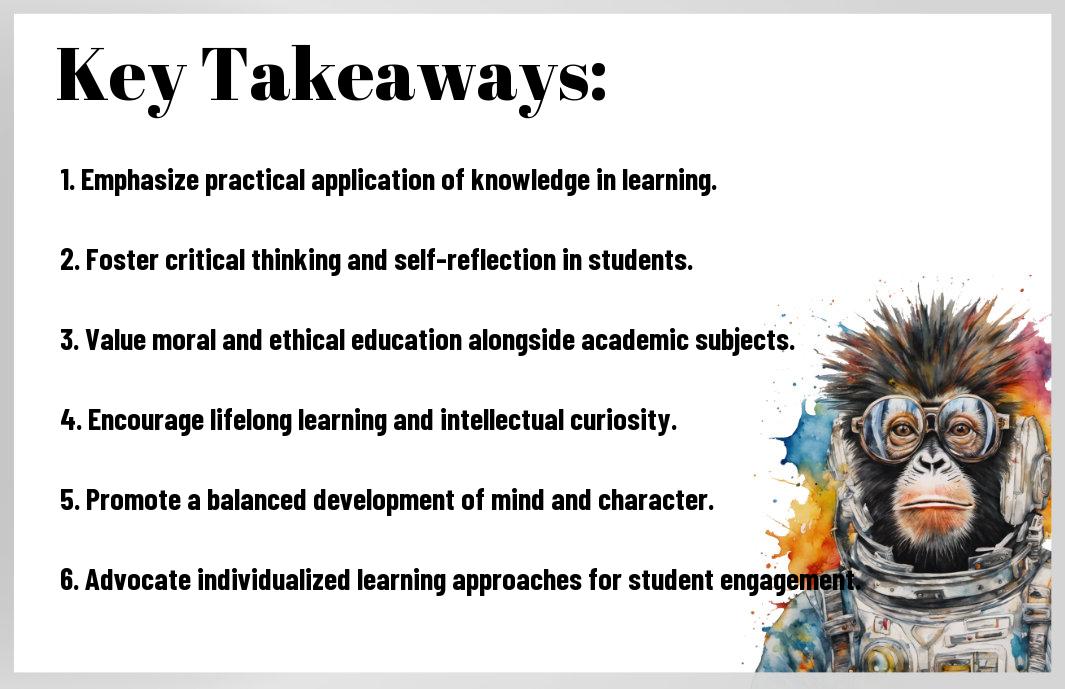Just when I thought I knew all the ins and outs of modern education, I stumbled upon the timeless wisdom of Aristotle. His educational philosophy still resonates today, offering insights that can enhance our teaching and learning experiences. In this post, I’ll share some key lessons from Aristotle that you can easily integrate into your own educational journey, whether you’re a student, teacher, or lifelong learner. Let’s explore how these ancient ideas can inspire us to make the most of our educational paths!
Key Takeaways:
- Holistic Development: Aristotle emphasized the importance of nurturing the whole person—intellectual, moral, and physical development.
- Experiential Learning: He advocated learning through experience, highlighting the value of practical applications to enhance understanding.
- Critical Thinking: Aristotle believed in fostering critical thinking skills, encouraging learners to question and analyze information rather than accept it passively.
- Community Engagement: He underscored the role of community and social interactions in education, promoting collective learning and shared experiences.
- Personalized Education: Aristotle recognized that each individual learns differently, advocating for tailored educational approaches to meet diverse needs.
- Ethical Foundation: He linked education to morality, stressing that instilling ethical values is imperative for responsible citizenship.
- Pursuit of Knowledge: Aristotle’s philosophy promotes a lifelong love for learning, encouraging individuals to seek knowledge beyond formal education.

The Value of Practical Wisdom in Education
As I explore Aristotle’s educational philosophy, I find great value in the concept of practical wisdom, or “phronesis.” It emphasizes the importance of applying knowledge to real-life situations, encouraging students not just to absorb information but also to understand how to utilize it outside of the classroom. In my view, education should go beyond mere theory; it should prepare learners to tackle everyday challenges thoughtfully and effectively. This integration of knowledge and experience cultivates a sense of responsibility and moral judgment, which are vital for personal and professional growth.
Real-World Applications
To truly appreciate the essence of practical wisdom in education, I believe it’s imperative to engage in real-world applications. Learning isn’t just about passing exams; it’s about gaining experience that can be translated into actionable insights. By involving students in community projects, internships, or collaborative workshops, we provide them the opportunity to see the relevance of what they learn. This hands-on experience fosters confidence and empowers them to make informed decisions in varied settings, preparing them for the complexities of life beyond academic walls.
Nurturing Critical Thinking
Beside practical knowledge, nurturing critical thinking is another significant aspect of Aristotle’s educational philosophy. I find that encouraging students to question assumptions, analyze arguments, and arrive at their conclusions creates an environment where intellectual curiosity thrives. When students are prompted to think critically about topics, they become more engaged and invested in their learning journeys. This skill not only enhances their academic performance but also equips them to tackle real-world problems more effectively, cultivating a generation of proactive thinkers who are prepared for the challenges ahead.
With critical thinking at the forefront, I aim to inspire students to be effective problem solvers. This involves teaching them to break down complex issues into manageable parts, assess various viewpoints, and evaluate evidence objectively. By fostering an atmosphere where inquiry is encouraged, I can guide them in developing their unique perspectives. This kind of deep thinking prepares learners not just to consume knowledge passively but to actively contribute to discussions and solutions, ensuring they are ready to face the ever-changing dynamics of our world with confidence and clarity.
The Importance of Community in Learning
Even in today’s fast-paced world, the value of community in the learning process resonates with Aristotle’s teachings. He understood that knowledge does not exist in isolation but flourishes through interaction with others. I believe this principle is just as relevant now; learning becomes richer and more meaningful when it happens within a supportive community. Whether it’s a classroom, a mentoring group, or even an online forum, the connection between learners fosters motivation, accountability, and collective growth. When we engage with our peers—sharing ideas, asking questions, and offering support—we create an environment in which everyone benefits. This collaborative spirit encourages us to push beyond our individual limits and experience the joy of collective learning.
Collaborative Learning Spaces
An vital aspect of building a learning community is the design of collaborative learning spaces. When I think about an effective educational setting, I envision a space where students are encouraged to work together, share insights, and tackle challenges as a unified team. Physical arrangements can greatly influence our interaction; for example, circular seating fosters dialogue and cooperation, while traditional rows may stifle collaboration. By creating environments that prioritize dialogue and teamwork, I find that learners tend to feel more engaged and invested in the material. As we nurture these collaborative spaces, we witness firsthand the transformative power of active engagement in our educational journeys.
Building Relationships in Education
Any learning experience I consider meaningful involves building strong relationships between educators and learners. Establishing a rapport with you can enhance your educational journey significantly. When students feel valued and understood, they’re more likely to participate and take risks in their learning. Additionally, peer relationships offer support and encourage shared learning experiences, which can lead to increased confidence and deeper understanding. I often think about how powerful it is to be in an educational community where trust is built, laughter is shared, and knowledge flows freely among all participants.
Another way we can foster strong relationships in education is by creating opportunities for informal interactions. When you share experiences, stories, and challenges, you gradually uncover common ground with your peers and educators. These connections enhance the overall learning experience and can transform a classroom into a close-knit community. By sharing your personal journey and actively engaging with those around you, you cultivate an inspiring space where everyone feels a sense of belonging and motivation to learn together.

Educating the Whole Person
After submerging into Aristotle’s educational philosophy, I find his approach to educating the whole person particularly inspiring. He believed that nurturing not just the intellect but also the body and character is necessary for holistic development. In our modern educational landscape, this idea resonates strongly. It’s about creating a balanced curriculum that fosters critical thinking while also emphasizing physical health and ethical values. I truly think that this foundation prepares students to engage thoughtfully with the world around them, leading to well-rounded individuals who can contribute positively to society.
Balancing Mind, Body, and Character
Across various educational frameworks today, the emphasis on balancing mind, body, and character has become more prominent. I believe that this balance is vital because each aspect influences the others. For instance, when we prioritize physical wellness, we often see an improvement in mental clarity and emotional stability. By nurturing character, we foster resilience and empathy in our learners. In my experience and observations, such a comprehensive approach equips individuals to face challenges with integrity and strength, enhancing not only personal growth but also community well-being.
The Role of Emotional Intelligence
Around the discussion of educating the whole person, emotional intelligence emerges as a fundamental component. I have discovered that cultivating emotional intelligence is just as important as academic knowledge in achieving success in life. It enables students to recognize and manage their emotions, empathize with others, and navigate social complexities. When educators integrate emotional learning into their curriculum, they create a learning environment that enhances self-awareness and interpersonal skills, which are necessary for personal and professional success.
To deepen my understanding of emotional intelligence, I’ve realized that it involves not just recognizing one’s feelings but also being able to express them appropriately. By fostering an environment that encourages students to engage in open conversations about emotions, we help them develop the tools they need to articulate their thoughts and feelings. This connection with self and others becomes indispensable as they move into adult life, demonstrating that the ability to relate to those around you is often just as important, if not more so, than gaining academic accolades.
Encouraging Curiosity and Inquiry
Unlike the rigid structures often seen in modern education, Aristotle championed an environment where curiosity and inquiry were not only welcomed but actively nurtured. He understood that genuine learning thrives in a space where questions led the way, rather than answers being the endpoint. By encouraging students to probe deeper into subjects, educators can foster a sense of wonder about the world. This approach transforms the typical classroom experience, empowering you to explore topics that genuinely intrigue you, opening up a path for lifelong learning.
Fostering a Love for Learning
Curiosity serves as the heartbeat of education; without it, the journey can feel mundane. By fostering an atmosphere that celebrates the act of questioning and exploring, we rekindle that innate desire to learn. I believe that when you encourage students to pursue their interests, you’re not just teaching them facts—you’re instilling a love for learning that can last a lifetime. Imagine a classroom where discussion flows freely, and exploration is as valued as mastering specific content. In such an environment, every lesson becomes a chance for conversation and discovery.
The Socratic Method Reimagined
Reimagined for today’s world, the Socratic Method can be a transformative tool for encouraging deep thinking and exploration. Rather than presenting information as a simple fact delivery, I envision using a dialogue-driven approach where you engage with questions and hypotheses. This method allows you to take ownership of your learning process while developing critical thinking skills. By challenging assumptions and examining different viewpoints, you create space for meaningful conversations that not only enlighten but also inspire.
Plus, this modern interpretation of the Socratic Method doesn’t just enhance understanding of the subject matter; it cultivates important skills like empathy and communication. As you engage with peers and navigate challenging questions, you learn not just from the content but from each other. This collective inquiry fosters a sense of community in the classroom, making learning a shared adventure rather than a solitary pursuit. By embracing this type of dialogue, you’re equipping yourself not just for academic success but for thoughtful engagement in life beyond the classroom walls.
Lifelong Learning: A Modern Necessity
Despite the challenges we face in today’s fast-paced world, Aristotle’s emphasis on lifelong learning resonates more than ever. As we navigate our personal and professional lives, the need for continuous education is paramount. I believe that viewing learning as an ongoing journey rather than a finite process expands our horizons in incredibly rewarding ways. By committing to lifelong learning, we position ourselves to adapt, grow, and thrive amidst the constant changes that life brings.
Embracing Continuous Growth
Learning is not merely an activity confined to our school years; it is a lifelong endeavor that enriches my life and your experiences. By embracing this growth mindset, I find that I am more open to new ideas and perspectives, enabling me to cultivate my passions and interests continuously. Engaging in workshops, reading books, or even exploring new hobbies becomes opportunities to expand my knowledge and skills, bringing excitement and fulfillment to my everyday routine.
Adapting to Change
On this journey of lifelong learning, adaptability is vital. The world around us is continually evolving, whether due to technological advancements or shifting societal norms. I’ve noticed that the more I invest in learning new things, the easier it becomes to adjust to these changes. I find that staying informed and open-minded allows me to navigate transitions with greater ease. Furthermore, being adaptable helps me see challenges as opportunities, ultimately leading to both personal and professional growth.
Even as we strive to acquire new skills and knowledge, it’s important to acknowledge that change is the only constant in life. This realization encourages me to remain curious and proactive, ensuring that I’m consistently aligned with current trends and innovations. By adapting to change, I not only enhance my own life but also contribute positively to those around me. The essence of Aristotle’s philosophy reminds me that growth is a continuous journey fueled by the pursuit of knowledge, which is crucial to thrive in an ever-changing world.

The Teacher’s Role as a Guide
Once again, I find myself reflecting on Aristotle’s educational philosophy, particularly his perception of the teacher as a guide in the learning process. In today’s fast-paced world, where there are countless distractions and an overwhelming amount of information, the role of the teacher has become even more significant. In this context, teachers are not just deliverers of knowledge; they are mentors and facilitators who support students in discovering and cultivating their own understanding and passions. By guiding students rather than merely instructing them, teachers empower learners to carve their own paths, developing critical thinking and problem-solving skills along the way.
Mentorship in the Classroom
About mentorship in the classroom, I believe it is a vital aspect of the modern educational experience. A mentor acts as a guiding light for students, providing support, encouragement, and wisdom when navigating the complexities of learning. You might notice that when a teacher takes on the mentorship role, students tend to flourish, as they feel seen and valued as individuals. This supportive relationship fosters an environment where students feel comfortable sharing their thoughts and questions, which in turn enhances their overall learning experience.
Creating Engaging Learning Environments
Teachers play a foundational role in creating engaging learning environments that nurture curiosity and promote active participation. When I think about the most effective classrooms I’ve encountered, they are often characterized by vibrant discussions, hands-on activities, and a sense of community among learners. By incorporating diverse teaching methods tailored to the unique needs of students, teachers can ensure that each learner feels connected and involved in their educational journey. This engagement not only encourages a love of learning but also deepens students’ understanding of the material.
But it’s necessary to remember that an engaging learning environment goes beyond just the activities and discussions. It’s about fostering a sense of belonging where students can express themselves freely and feel empowered to take risks. When I create this type of atmosphere, I notice that students are more willing to explore new ideas and challenge themselves. In embracing Aristotle’s vision, I strive to be not just an instructor, but an architect of dynamic learning spaces that invite students to think critically and engage deeply with their education.
Final Words
Taking this into account, I find that Aristotle’s educational philosophy holds timeless lessons that we can apply to our modern learning environments. By emphasizing experiential learning and the importance of nurturing one’s innate abilities, I believe I can create a more engaging and effective educational experience. It encourages me not only to acquire knowledge but also to develop virtues and character, which are vital for personal growth and responsible citizenship. With Aristotle’s insights, I feel more equipped to foster a love of learning that goes beyond textbooks and tests.
If you’re curious about the deeper contributions Aristotle made to education, I highly recommend exploring more of his ideas. The combination of his thoughts on practical application and moral development can reshape how we view education in today’s world. I truly believe that embracing these principles can lead you on a more fulfilling and well-rounded educational journey. For additional insights, you can check out this link on What did Aristotle contribute to education?.
FAQ
Q: What are the core principles of Aristotle’s educational philosophy?
A: Aristotle’s educational philosophy is grounded in the pursuit of knowledge, the importance of virtue, and the development of critical thinking. He emphasized the idea of learning as an active process rather than passive absorption of information. His belief in the integration of ethics and education highlights that moral and intellectual virtues are intertwined, leading to a well-rounded individual capable of contributing positively to society.
Q: How does Aristotle’s view on rhetoric influence modern education?
A: Aristotle regarded rhetoric as an important skill for effective communication and argumentation. In modern education, this underscores the significance of teaching students not just to comprehend texts but also to express their thoughts clearly and persuasively. This aligns with contemporary education’s focus on critical thinking, debate, and presentation skills, cultivating informed citizens equipped to engage in civic life.
Q: In what ways can Aristotle’s emphasis on experiential learning be applied today?
A: Aristotle championed the idea that knowledge is gained through experience and practical engagement. Modern educators can incorporate this into lesson plans by using project-based learning, internships, and hands-on activities that relate to real-world scenarios. This approach not only enhances comprehension but also fosters retention of ethical principles as students apply their learning in practical contexts.
Q: How relevant is Aristotle’s concept of the “Golden Mean” to today’s educational practices?
A: Aristotle’s “Golden Mean” refers to the idea of finding balance and moderation in behavior. In contemporary education, this concept encourages the development of balanced individuals who can navigate extremes and make reasoned decisions. By promoting critical thinking, emotional intelligence, and ethical reasoning, educators can help students embody this principle, fostering resilience and holistic growth.
Q: What lessons can educators draw from Aristotle’s views on the role of the teacher?
A: Aristotle believed that teachers should not only impart knowledge but also foster moral development and critical inquiry in their students. This perspective encourages educators today to serve as mentors who inspire curiosity, guide ethical reasoning, and nurture each student’s unique potential. By adopting this multifaceted approach, educators can play a transformative role in learning environments.
Q: How does Aristotle’s framework of categorizing knowledge inform current educational methodologies?
A: Aristotle categorized knowledge into theoretical, practical, and productive domains, which can inform current educational methodologies by promoting a well-rounded curriculum that incorporates theory, practical skills, and creativity. This encourages an interdisciplinary approach in education, allowing students to draw connections across subjects and fostering a deeper understanding of complex concepts.
Q: What significance does Aristotle’s notion of community have in contemporary education?
A: Aristotle believed that education plays a central role in building a good society, emphasizing communal values and responsibilities. This notion can be leveraged in contemporary education by promoting collaborative learning, service-learning opportunities, and a strong sense of community within school environments. Such an approach helps develop socially responsible individuals who are aware of their impact on others and the society they inhabit.


